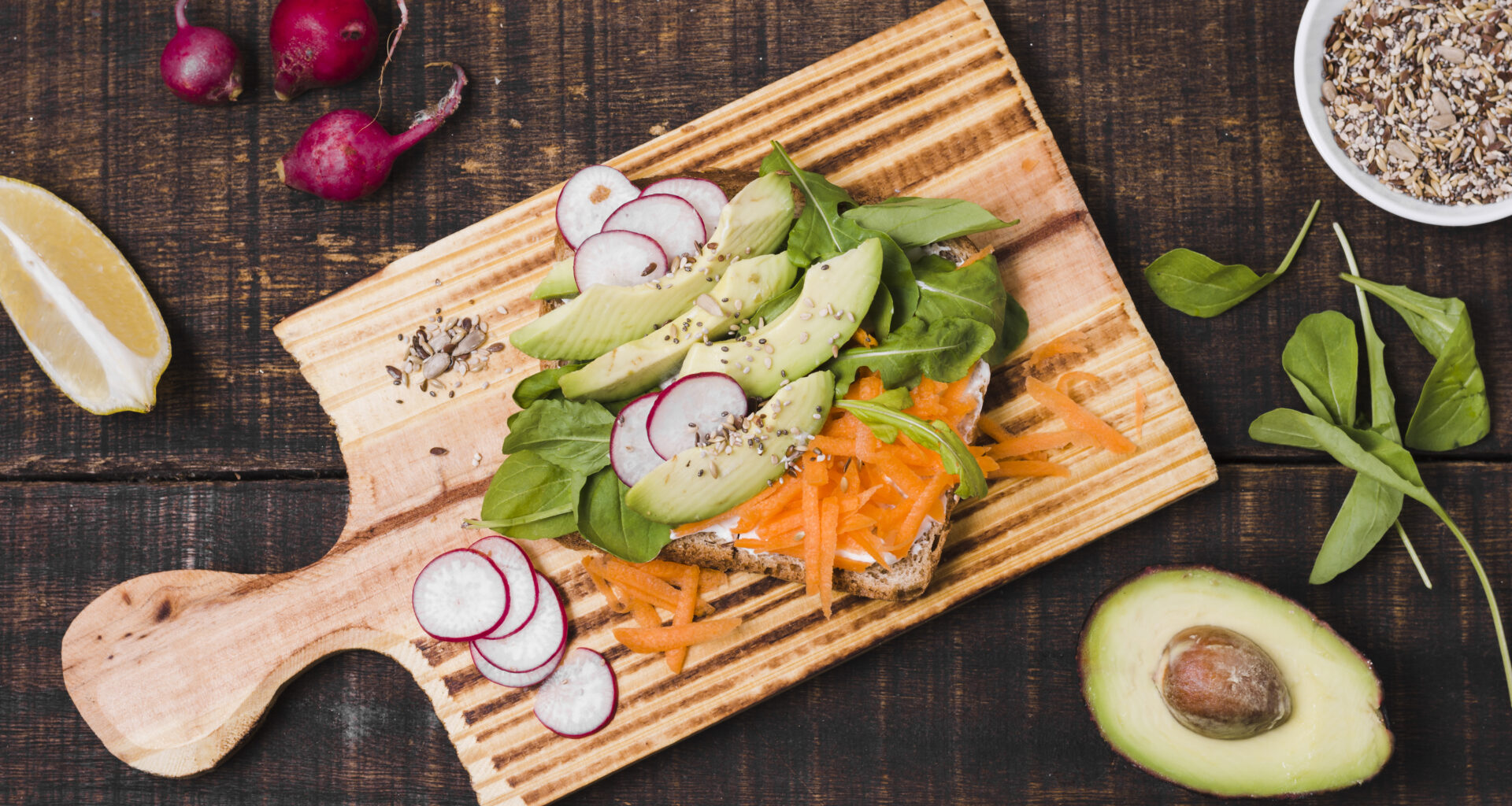In a world full of trendy diets, the ketogenic diet for weight loss is like a superhero, changing how we think about losing weight and staying healthy. The 4 different types of Keto diet cater to your specific weight loss needs; and they are all diabetic friendly. Moreover, a ketogenic diet also stabilizes blood sugar, improves mental function, increases energy levels, helps control appetite, reduces cholesterol, and even has anti-inflammatory benefits. So here’s a beginner’s guide to ketogenic diets.
What is the Ketogenic Diet?
The keto diet is a way of eating that’s low in carbs and high in fat. Its goal is to put your body in a state called ketosis, where it burns fat for energy instead of carbs. To reach ketosis, you cut down on carbs and increase your intake of fats. This shift in how your body gets energy helps it burn fat more effectively, which can lead to weight loss. So, instead of relying on carbs, the keto diet encourages your body to use fat as its main source of fuel. Moreover, you can opt fad Diets for sustainable weight loss.
What are the basic rules for Ketogenic Diet?
The basic rules of the ketogenic diet for weight loss involve drastically reducing carbohydrate intake to typically less than 50 grams per day, while increasing fat consumption to comprise about 70-80% of daily calories. Moderate protein intake is also recommended, constituting around 20-25% of total calories.
Foods allowed on the keto diet include healthy fats like avocados, nuts, seeds, and oils, along with moderate protein sources such as meat, fish, and eggs, while starchy and sugary foods like grains, fruits, and sweets are restricted. It’s essential to stay hydrated and maintain electrolyte balance, especially during the initial transition phase, to mitigate potential side effects like the “keto flu.” Consulting with a healthcare provider or nutritionist before starting the ketogenic diet is advisable to ensure it aligns with individual health goals and needs.
What To Eat In Keto Diet?
Standard Ketogenic Diet (SKD)
The SKD is the most common and straightforward version of the ketogenic diet for weight loss. It typically consists of low-carbohydrate, moderate-protein, and high-fat foods. Foods commonly consumed on the SKD include non-starchy vegetables like leafy greens, cruciferous vegetables, and avocados, along with healthy fats such as olive oil, coconut oil, butter, and fatty cuts of meat like beef, pork, and poultry. Protein sources often include fish, eggs, and moderate amounts of cheese. Foods to avoid on the SKD include high-carbohydrate foods like grains, fruits, starchy vegetables, and sugary snacks.
Cyclical Ketogenic Diet (CKD)
The CKD involves alternating between periods of strict ketogenic eating and higher-carbohydrate refeeding days. During the ketogenic phase, similar foods are consumed as on the SKD, focusing on low-carb, high-fat options. However, during the carbohydrate refeeding days, individuals may consume higher-carb foods such as fruits, whole grains, and starchy vegetables to replenish glycogen stores. These refeeding periods are typically timed around intense workouts or physical activities to optimise performance.
Image Source: Pinimg
Targeted Ketogenic Diet (TKD)
The TKD allows for the consumption of small amounts of carbohydrates around workouts to provide quick energy while still maintaining ketosis. Common foods consumed on the TKD include easily digestible carbohydrates like fruits or glucose-containing supplements consumed before or after exercise to fuel workouts and enhance performance. Outside of these targeted periods, individuals follow a standard ketogenic eating pattern similar to the SKD.
High Protein Ketogenic Diet
The high protein ketogenic diet is similar to the SKD but emphasises higher protein intake to support muscle growth and maintenance. In addition to the foods consumed on the SKD, this variant includes more protein-rich foods such as lean meats, poultry, fish, eggs, and higher-protein dairy products like Greek yoghurt and cottage cheese. While fat intake remains high, protein comprises a larger proportion of total calories, making up around 35-40% of daily intake, with fat and carbohydrates constituting the remaining calories.
Is Keto Diet Good For Weight Loss?
The main aim of the ketogenic diet is weight loss, and it does this by promoting a state called ketosis. When your body is in ketosis, it turns into a fat-burning powerhouse. The liver transforms fats into ketones, acting as a different fuel source. This not only helps in losing extra weight but also plays a role in preserving muscle mass, which is vital for long-term and effective weight management. So, by encouraging your body to use fat for energy, the ketogenic diet becomes a reliable method for shedding pounds while maintaining important muscle mass.
Is Keto Diet Good For Diabetic People?
The ketogenic diet (Keto) may offer potential benefits for individuals with diabetes, but it requires careful monitoring and medical supervision. Some studies suggest that the Keto diet may help improve blood sugar control and reduce insulin resistance, which are beneficial for managing type 2 diabetes. By restricting carbohydrate intake and promoting the use of fat for fuel, the Keto diet can lead to lower blood sugar levels and decreased reliance on exogenous insulin. However, individuals with diabetes should work closely with healthcare professionals to ensure that their nutritional needs are met while on the Keto diet, as it may require adjustments to medication dosages and close monitoring of blood sugar levels to prevent hypoglycemia or other adverse effects. Additionally, long-term adherence to the Keto diet may pose challenges, and further research is needed to fully understand its effects on diabetes management and overall health outcomes.
7 Holistic Benefits of Keto Diet
While the main goal of the ketogenic lifestyle is to help with weight loss, it brings other good things too. People who follow it often feel more energetic, think more clearly, and stay focused better. The holistic benefits of keto diet include:
Efficient Weight Loss
The ketogenic diet triggers a metabolic state known as ketosis, where the body shifts from using carbohydrates to burning stored fat for energy. This fundamental change in energy sourcing leads to a significant and sustained loss of excess weight.
Blood Sugar Stability
Keto’s emphasis on low-carbohydrate intake helps stabilise blood sugar levels. This makes it particularly advantageous for individuals managing diabetes or those dealing with insulin resistance, promoting overall metabolic health.
Enhanced Mental Function
Individuals adhering to the ketogenic diet frequently report cognitive benefits. Improved mental clarity, heightened focus, and increased cognitive function are commonly associated with the stable energy levels achieved through ketosis.
Consistent Energy Levels
A hallmark of the ketogenic diet is the consistent energy it provides. By efficiently burning fat for fuel, individuals often experience sustained energy levels throughout the day, reducing the highs and lows associated with fluctuating blood sugar levels.
Appetite Control
One of the notable advantages of keto is its impact on appetite control. The diet has been shown to reduce hunger and cravings, facilitating better control over calorie intake and supporting weight management.
Improved Cholesterol Profile
Contrary to concerns about the diet’s impact on cholesterol, keto is associated with positive changes in lipid profiles. It increases high-density lipoprotein (HDL) cholesterol, often referred to as “good” cholesterol, while reducing triglyceride levels.
Anti-Inflammatory Effects
The ketogenic diet exhibits potential anti-inflammatory effects. By reducing the intake of inflammatory foods and promoting a state of ketosis, individuals on keto may experience a lower risk of inflammatory conditions. For better option vegan diet for weight loss is also a good option.
Foods To Avoid in Keto Diet?
- Sugary Foods: Cut out sugary items like candy, soda, and pastries.
- Grains or Starches: Say no to bread, pasta, rice, and cereal.
- Fruit: Limit high-sugar fruits like bananas and grapes.
- Beans or Legumes: Avoid beans, lentils, and chickpeas.
- Root Vegetables and Tubers: Steer clear of potatoes, carrots, and parsnips.
- Low Fat or Diet Products: Skip low-fat or diet foods, as they often contain added sugars.
- Unhealthy Fats: Stay away from processed oils and trans fats.
- Alcohol: Limit or avoid alcoholic beverages, as they can hinder ketosis.
Image Source: Elitelv
Keto Diet Snacks
A keto diet plan for beginners should include keto diet snacks to make the transition easier. These snacks are low in carbs and high in healthy fats and protein to keep you feeling satisfied between meals while maintaining ketosis. Opt for snacks like nuts and seeds, cheese cubes, hard-boiled eggs, avocado slices, olives, deli meat roll-ups, and veggie sticks with guacamole or hummus. Additionally, you can enjoy keto-friendly protein bars or shakes, pork rinds, or small portions of berries with whipped cream. Just remember to watch portion sizes and choose snacks that fit within your daily carb limit.
Read More: Order of Foods
Keto Diet Side Effects
Short-Term Discomfort (Keto Flu)
When starting a ketogenic diet for weight loss, individuals may experience symptoms like fatigue and headaches as the body adapts to using ketones for energy instead of carbs.
Digestive Issues
Changes in fibre intake can lead to digestive discomfort such as constipation or diarrhoea; increasing fibre-rich foods and staying hydrated can alleviate these symptoms.
Nutrient Deficiencies
Eliminating certain food groups may result in deficiencies in vitamins and minerals like vitamin C and potassium; it’s important to include a variety of nutrient-dense foods or consider supplements.
Long-Term Health Risks
There are concerns about increased cardiovascular risk due to high saturated fat intake and potential kidney or bone health issues from prolonged high protein consumption; regular monitoring and medical guidance are recommended for long-term keto followers.
Read More: Ways to Lose Weight
Conclusion
The ketogenic diet for weight loss isn’t just a short-lived trend; it’s a big change in how you live that goes beyond just losing weight. By following the keto way of eating, you can make yourself healthier overall. It doesn’t matter if you’re just starting and need some help or if you’ve been doing it for a while and want to try new things – the keto diet is a flexible and best diet for health to make your health better. So, why not give it a try and see how great it can be for you? And remember, making informed choices about your diet is essential for overall health, so consider exploring different options like the Mediterranean diet, known for its heart-healthy benefits, alongside the keto diet.
FAQs
Yes, keto can be effective for weight loss by promoting fat burning through ketosis and reducing appetite due to increased protein and fat intake.
Weight loss varies, but some people may lose up to 10 pounds or more in the first month of following a ketogenic diet, depending on factors like starting weight and adherence.
Keto can help reduce belly fat as it targets stored fat for energy, including visceral fat around the abdomen, but individual results may vary.
Common side effects of the keto diet include short-term discomfort known as “keto flu,” digestive issues like constipation or diarrhoea, nutrient deficiencies, and potential long-term health risks associated with high fat and protein intake.




